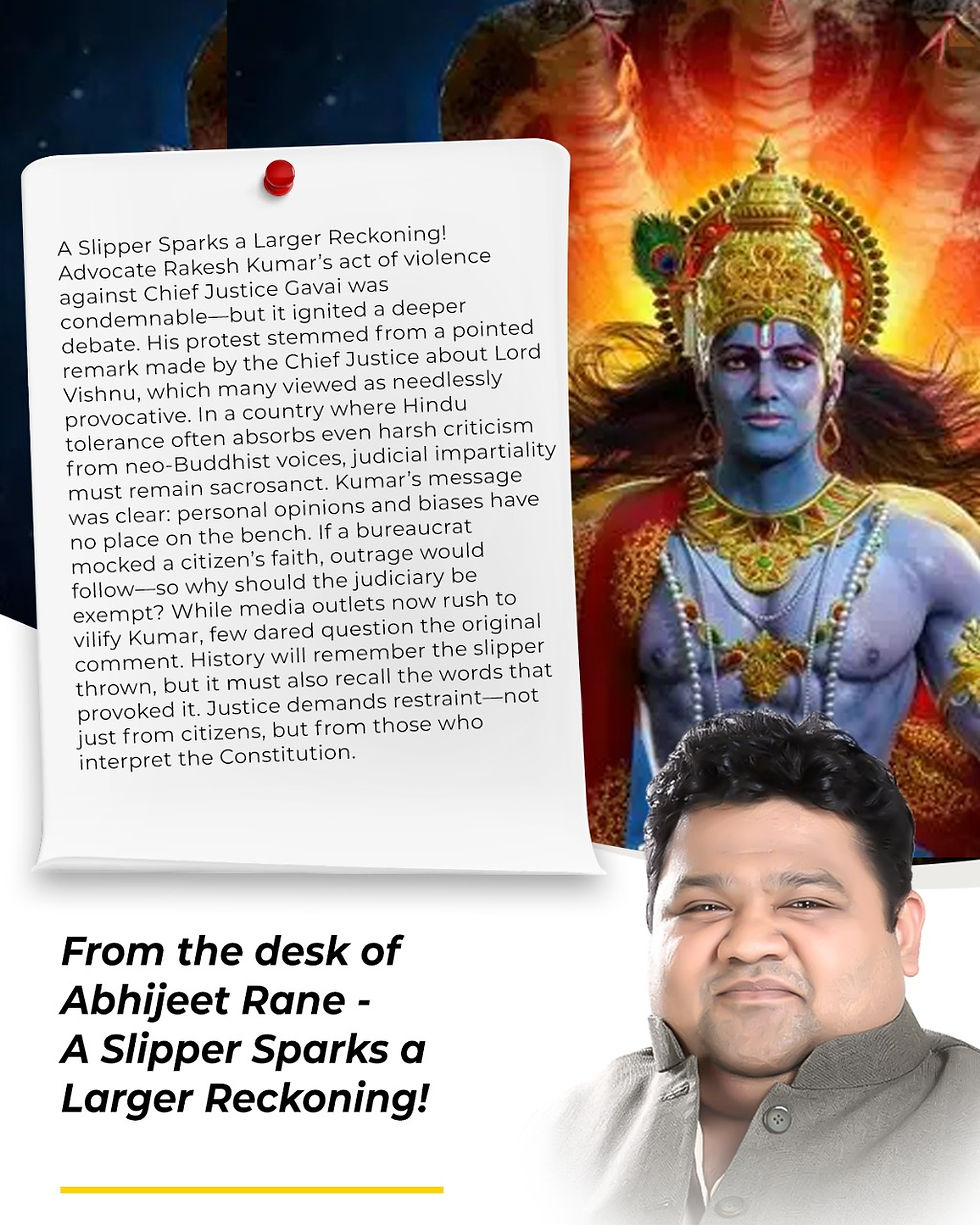🖋️ From The Desk of Abhijeet Rane
- dhadakkamgarunion0
- Oct 9, 2025
- 3 min read
🖋️ From The Desk of Abhijeet Rane
A Slipper Sparks a Larger Reckoning! Advocate Rakesh Kumar’s act of violence against Chief Justice Gavai was condemnable—but it ignited a deeper debate. His protest stemmed from a pointed remark made by the Chief Justice about Lord Vishnu, which many viewed as needlessly provocative. In a country where Hindu tolerance often absorbs even harsh criticism from neo-Buddhist voices, judicial impartiality must remain sacrosanct. Kumar’s message was clear: personal opinions and biases have no place on the bench. If a bureaucrat mocked a citizen’s faith, outrage would follow—so why should the judiciary be exempt? While media outlets now rush to vilify Kumar, few dared question the original comment. History will remember the slipper thrown, but it must also recall the words that provoked it. Justice demands restraint—not just from citizens, but from those who interpret the Constitution.
🔽
🖋️ From The Desk of Abhijeet Rane
Religious Bias Allegations in Beed Jail Demand Serious Scrutiny! Recent statements by MLA Gopichand Padalkar have sparked a storm over alleged religious discrimination within Beed’s prison system. Padalkar claims that police officials have removed idols of Chhatrapati Shivaji Maharaj and Lord Ganesha, along with photos of Dr. Babasaheb Ambedkar and Mahatma Gandhi, from the prison premises. He further alleges that inmates are being discouraged from performing bhajans and kirtans, and that officials are promoting religious conversion by offering money. These are serious accusations that challenge the secular fabric of governance. If true, such actions strike at the heart of India’s constitutional values. The government must order an impartial inquiry to uncover the truth and ensure that no administrative institution becomes a ground for religious coercion or suppression of faith.
🔽
🖋️ From The Desk of Abhijeet Rane
From Infamy to Inspiration: The Remarkable Journey of Veerappan’s Daughter! In a heartwarming tale of redemption and hope, Vidya Veerappan, the daughter of the infamous sandalwood smuggler Veerappan, has emerged as a respected lawyer and a beacon of social progress. Raised under the care of the Rashtriya Swayamsevak Sangh (RSS) after her father’s death, Vidya transformed her life through education, discipline, and humanitarian values. Her mentor, Raju Arya, highlighted how her journey symbolizes the power of compassion and guidance to reshape destinies. Vidya’s dedication to serving society as an advocate proves that no birth or background can define one’s future. Her story stands as a shining example of how humanity and education can turn even the darkest legacy into a source of national pride.
🔽
🖋️ From The Desk of Abhijeet Rane
Metro Woman Of Maharashtra, Ashwini Bhide !!! Mumbai Metro Line 3 — India’s largest underground metro project — is now complete. Spanning 33.5 km from Cuffe Parade to SEEPZ, it will cut travel time from two hours to just 45 minutes. At the heart of this achievement stands Ashwini Bhide (IAS), Managing Director of MMRCL, whose leadership turned a daunting dream into reality. Navigating legal, environmental, and political hurdles, she led with clarity, resilience, and a “Mumbai First” mindset. Her transparent communication and unwavering commitment guided the project through protests, delays, and public resistance. With 27 underground stations and thousands of engineers and workers, this metro isn’t just infrastructure—it’s a symbol of urban confidence. Ashwini Bhide’s journey proves that visionary women in leadership don’t just manage—they transform cities. Mumbai Metro Line 3 is her legacy beneath the surface.
🔽
🖋️ From The Desk of Abhijeet Rane
Selective Outrage or Constitutional Blind Spot? After the 2019 Lok Sabha elections, Rahul Gandhi claimed during his U.S. visit that “people are no longer afraid.” This was interpreted as a shift from the alleged climate of fear under the Modi government. When a slipper was thrown at Prime Minister Modi’s convoy, it was seen as a sign of fearless dissent. Yet, when a shoe was hurled at Chief Justice Gavai, Congress called it “an attack on the Constitution.” This contrast has sparked debate: if the Prime Minister holds a constitutional office, why is dissent against him framed as courage, while similar acts against the judiciary are labeled sacrilege? Critics argue this reveals a troubling double standard. The question remains—does reverence for constitutional institutions apply selectively, or should all such offices be equally shielded from symbolic aggression?
🔽
#JudicialEthics #ReligiousFreedom #Inspiration #WomenLeadership #RahulGandhi #AshwiniBhide #DoubleStandards #DevendraFadnavis #FromTheDeskOfAbhijeetRane #MumbaiMitra






Comments